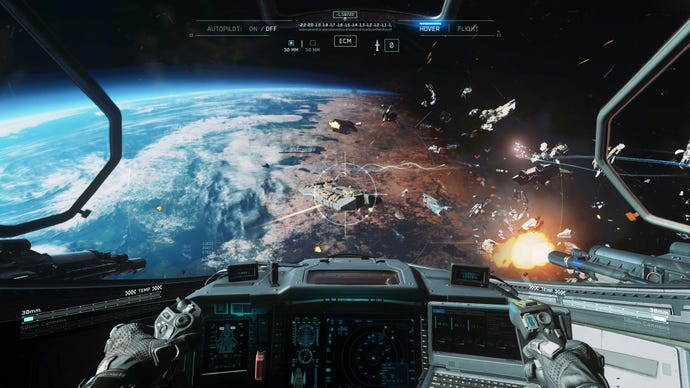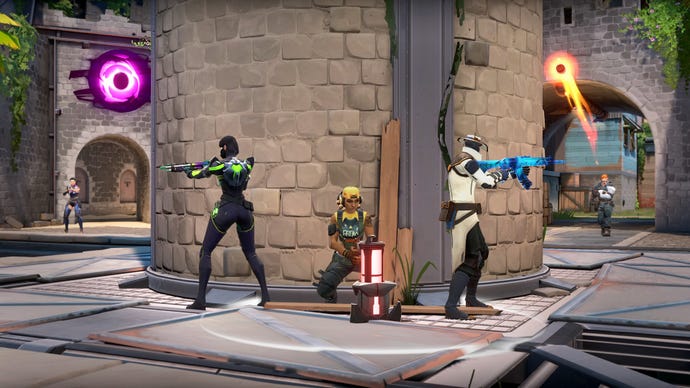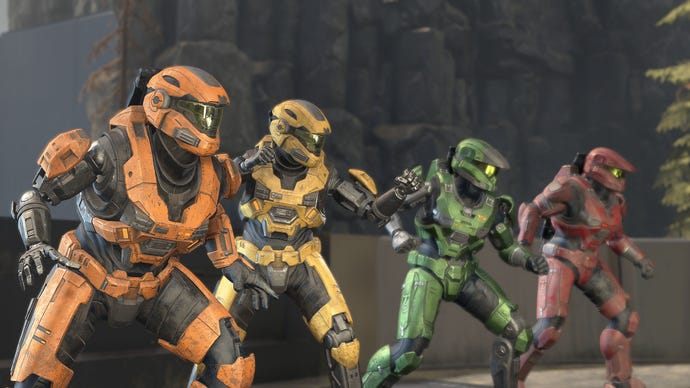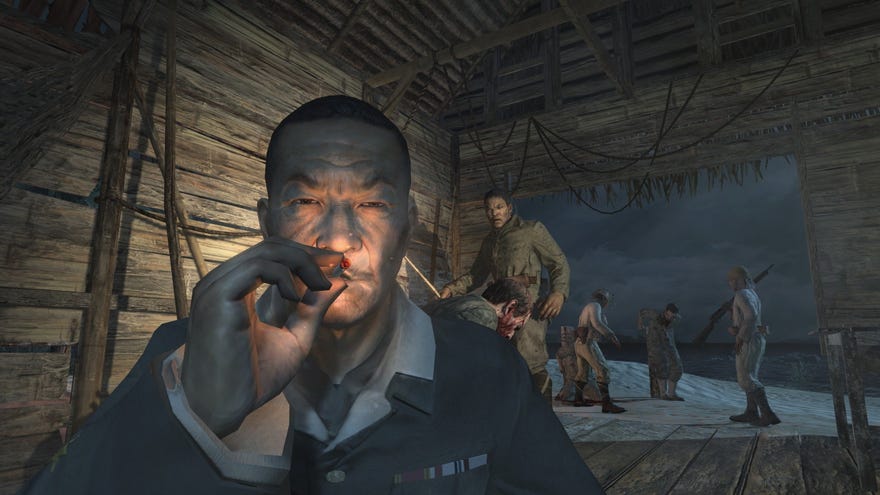Do FPS games even need a single-player campaign these days?
Let's zoom in
In the last few weeks I’ve spent a lot of time looking through scopes. Red dots and ACOGs and telescopic ones. From one FPS to the other, I put my eye up to a lens and I press triggers. Sometimes I’m a sniper dropping Nazis to protect my father, sometimes I’m a soldier surrounded by 127 other players. Lately, I’m a chunky spartan with crunchy crayon armour.
All this time with the three big FPSes of the year, each packaged in their own ways, has left me wondering what’s important nowadays. Do they need campaigns, or is multiplayer-only the way to go? How about introducing one a bit later than the other?
Call Of Duty: Black Ops 4. Remember that one? No, probably not. But this fourth edition of the Blopsverse was the first to ship without a story mode. The devs decided that they’d lop off the campaign component because player data showed that we were spending less time in the story, and more in all-out online war. According to the numbers, we were all giggling among bullet casings in a state of multiplayer euphoria, so it made sense to balance that equation. Generate more multiplayer #content and other digits would multiply exponentially.
The Blops 4 devs did replace the traditional COD campaign with quick story missions for the game’s various characters, but reviews suggest these were disjointed and a far cry from the usual corridor dash. I can’t say I ever really played Blops 4, so I can’t attest to the dismay of players who missed the campaign, but I reckon if I travelled back in time I’d be miffed.
For me at least, campaigns matter. This might seem a bit hypocritical coming from someone who said that Call Of Duty: Vanguard’s story was unambitious filler, but that’s because it comes from the heart. I really do care, mate, and I semi-grilled COD this year for a similar reason. I know the devs can cook up a better story: the original Modern Warfare had the magnificent All Ghillied Up, with its heart-pounding crash course in sniping; Modern Warfare 2 featured James Bond-inspired snow mobile chases; Black Ops made you question the NUMBERS MASON; even Infinite Warfare was a sorely underrated space opera. They’ve since flatlined, but these stories were once an integral part of the package.

Battlefield 2042 doesn’t have a story mode. Loads of Battlefield games haven’t bothered, with the only one that sticks out in my memory being Bad Company 2. Which is funny, because I reckon BC2 is the best Battlefield I’ve ever played. There’s one scene where a missile pulverises an enemy settlement with one colossal bang, and one of your squaddies turns around and exclaims, “That is the greatest thing I have ever seen in my entire life.” Not only is the story filled with some genuinely funny moments like this, it’s one which brings you closer to your teammates than any other Battlefield game. And this makes a huge difference, as it elevates the universe you’re blasting to smithereens.
Whenever I dip into Battlefield 2042 - or most other Battlefields without a campaign – I struggle to connect with the soldiers I embody. There’s Paik, a Korean Specialist with cool tech that allows her to see enemies through walls. She seems vibrant and plucky, with the capacity for major destruction. But that’s a personality I’ve constructed, as I’ve got nothing but her appearance and the odd voice line to go on. Each Battlefield I enter, no matter how vast or grand, holds no weight, either. I’ve seen no meaningful wars waged on these verdant hills. No emotional moments. Just 128 bodies melding into one another like a tasteless soup.
But then, I suppose you create your own memories. Games like Battlefield are reliant on constructing your own legendary tales, like that time you downed that Apache helicopter with a wad of C4 and a dream. As you play, you could argue that you're spinning your own narrative, as opposed to having this pre-constructed story sitting there in the menus and overwriting everything you create.

The same sentiment rings true of games like Valorant and CS:GO, with their esportsy emphasis. They don't have campaigns and yet I enjoy them immensely. In fact, I'd say they don't need a story mode to better themselves. I reckon that's because they're built with competition in mind. These are extremely popular games, but they make no qualms about alienating a certain crowd. If you aren't here to take pleasure in a mastery of maps, aiming, and strategy, then perhaps you'd best take your business elsewhere.
Story comes later with competitive-minded games anyway. You get comics and animated shorts of your favourite characters doing some extra-curricular activities. Here, a campaign isn't absolutely necessary. If you hunger for more, then the devs can feed you chunks of backstory in-game or outside of it. Story is an extension here, not a necessity, I think.
Speaking of extensions, let's touch on Halo: Infinite, which has launched - technically it's still in beta, but come on now - with a bunch of multiplayer modes but no campaign, which is a separate, paid-for thing. How do I feel about that? Yeah, fine. If anything, this one feels like a symptom of the covid pandemic with its delays and forced company restructures, than it does a calculated decision. Sure, there's definitely an element of "Let's entice them into buying the campaign and earn lots of money through micro-transactions", but it also seems like a peace offering of sorts.

I know Infinite's campaign and its other features (co-op and Forge) are on their way, so this multiplayer beta floating free of its story component feels fine to me. And that may be because it's not only backed by years of history anyway, but because we're reacting positively to the present. We're fine without the story component this time, as Halo feels like Halo again. Unlike the last couple of Halo games, Infinite has provenance. Even just jumping into its early multiplayer modes, there's this sense that it's reconnected with its past, despite its splintered present.
But I couldn't see Halo ever adopting a no-campaign model. Oh no, that wouldn't seem right. This is a ringed universe with too much to offer and Chief's story isn't over yet! Plus, if we fully zoom out and look at the bigger picture for a second, campaigns often hold importance in a much simpler way. They suit people who just don’t care for the competitive side of things. Not everyone has that urge to hop into lobbies filled with people like ObiWanBigBoaby and TommyHilTrigger. Lots of folks just want to soak in a few hours of spectacle, then leave it at that.
I'm a bit of both. Often I'll devour the campaign, then move onto the multiplayer once I've ticked it off and got my eye in. But how about you? What are your thoughts on FPSes and campaigns? Yay, nay, or wahey?
California's Department Of Fair Employment And Housing are currently suing Call Of Duty publisher Activision Blizzard for discrimination, harrassment, and retaliation, alleging that women are paid less and treated poorly in "a pervasive 'frat boy' workplace culture". Over 2600 current and former employees signed an open letter condeming the company's initial response. Blizzard Entertainment president J. Allen Brack has now left the company, and a number of others have reportedly been let go. A new report now alleges that Activision CEO Bobby Kotick was aware of the allegations but did nothing about them. The company has recently set up a new committee to prevent harassment and discrimination, but Kotick remains in power. Employees and shareholder groups are still calling for Kotick's removal.

